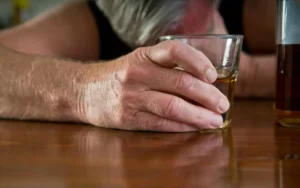
The information we provide is not intended to be a substitute for professional medical advice, diagnosis or treatment. It should not be used in place of the advice of your physician or other qualified healthcare providers. Frequent exposure to alcohol and other substances can increase the risk of addiction. In particular, early exposure can heighten the risk of gaining a physical dependency on alcohol, especially in a familial setting. However, scientists also argue that genetics play a significant role in the risk of developing alcoholism and the likelihood of hereditary effects. The study is also important because of the massive health and socio-economic impacts of substance abuse in general.

Dysregulation of microRNA Expression and Function Contributes to the Etiology of Fetal Alcohol Spectrum Disorders
- COGA was designed during the linkage era to identify genes affecting the risk for alcohol use disorder (AUD) and related problems, and was among the first AUD‐focused studies to subsequently adopt a genome‐wide association (GWAS) approach.
- Sensitivity to alcohol exposure varies among individuals within and across populations.
- Unfortunately, studies of alcoholdependence have not yet attained these sample sizes.
- The values of liability-scale h2 of AUD of 12.4% (in LA) to 16.2% (in AFR) can be explained by the current study.
Alcohol levels in common drinks rangefrom approximately 5% (1.1 M) for beer, 11-15% for wine (∼3M) and 40% for spirits (∼9 M). The oral cavity and esophagus aredirectly exposed to those levels, and the liver is exposed to high levels from theportal circulation. Thus it is not surprising that diseases of the GI system,including cirrhosis, pancreatitis, and cancers of the upper GI tract are affected byalcohol consumption80-86.
1. Resilience and protective factors
- Because the diagnosis of an AUD requires the presence of a set ofsymptoms from a checklist, there are many different ways one could meet thecriteria.
- Candidate gene approaches, as well as family-based linkage studies together with genome-wide association studies (GWAS), have implicated many variants in and around the seven ADH genes that contribute to alcohol dependence or alcohol-related traits, including alleles of ADH1A, ADH1B, ADH1C, ADH2 and ADH4.
- ADH1B and ALDH2 may also protect against both alcohol consumption and alcohol use disorder.
- However, evidence that links candidate genes within QTL regions causally to the phenotype remains difficult to obtain.
- There are also countless environmental factors (work, stress, relationships) that may lead to alcoholism.
- Other genes, including GABRA2, CHRM2, KCNJ6, and AUTS2, may also significantly affect risks.
Themost common initial approach was linkage analysis, in which markers throughout thegenome were measured to identify chromosomal regions that appeared to segregate withdisease across many families. Linkage studies are relatively robust to populationdifferences in allele frequencies (because they test within-family inheritance), andcan find a signal even if different variants in the same gene or region areresponsible for the risk in different families. The drawback to this approach isthat linkage studies find broad regions of the genome, often containing manyhundreds of genes.
PAU PRS for phenome-wide associations

Moreover, people who use drugs are facing an increasingly dangerous drug supply, now often tainted with fentanyl. Approximately 107,000 people died of drug overdoses in 2021, and 37% of these deaths involved simultaneous exposure to both opioids and stimulant drugs. Drug use and addiction represent a public health crisis, characterized by high social, emotional, and financial costs to families, communities, and society.
- Alcohol “dependence” generally refers to physiological addiction, when cessation of alcohol intake precipitates withdrawal reactions, which range from anxiety and shakiness to severe complications, such as seizures and delirium tremens.
- Those who have a family history of alcoholism have a higher risk of developing a drinking problem.
- These studies enabled the identification of differential gene expression (DGE) in the brains of patients with AUD.
- COGA’s wealth of publicly available genetic and extensive phenotyping data continues to provide a unique and adaptable resource for our understanding of the genetic etiology of AUD and related traits.
- Priyom holds a Ph.D. in Plant Biology and Biotechnology from the University of Madras, India.
The genetics of alcoholism: identifying specific genes through family studies

In many cases, the initial linkage studies were followed by moredetailed genetic analyses employing single nucleotide polymorphisms (SNPs) that weregenotyped at high density across the linked regions. Some of the genes identifiedthrough this approach have been replicated across a number of studies and appear tobe robust genetic findings. Several GWAS and meta-analyses studies have reported a vast number of risk alleles for alcohol dependence with little overlap among studies. This is attributable to different phenotypic https://ecosoberhouse.com/ assessments, use of different species and different preparations, including different tissues or brain regions analyzed, and genome-by-environment interactions. The link between genotype and phenotype is likely also confounded by multidimensional gene-gene interactions, the magnitudes of which depend on allele frequencies (Mackay 2014). In addition, the genetic architectures that underlie different phenotypic manifestations of alcohol drinking behavior appear to be distinct.


Children of people with AUD may be 2-6 times more likely to develop problems with alcohol use when compared to those whose parents do not have alcohol use disorder. Two recent studies on the same large datasets used the maximum number of alcoholic drinks consumed in a 24-h period (MaxDrinks) as phenotypic measurement (Kapoor et al. 2013; Pan et al. 2013). Both studies found different genes from those identified by previous meta-analyses and the results from these two studies showed little, if any, overlap. It is now appreciated that a whole spectrum of allele frequencies andeffect sizes may play roles, from common variations with small effects throughrare variants of large effect.
Even just looking at alcohol alone there is a vast health cost, with more than 3.3 million people worldwide die each year from excessive alcohol use, according to the World Health Organization. In the United States, the economic costs of alcohol abuse are estimated to be as high as $249 billion each year, according to the Centers for Disease Control. “In fact, using this questionnaire in a population not ascertained for alcohol use disorders we have been able to achieve the largest sample size even obtained in the field of alcohol use disorders,” said Sanchez Roige. The more risk factors a person has, the greater the chance of developing an alcohol use disorder or addiction. COGA researchers will interview subjects using the Semi-Structured Assessment for the Genetics of Alcoholism (SSAGA),45 specifically created for the COGA project. Each subject is asked to participate in the SSAGA, with different versions for adolescents and for parents being interviewed about their children.
Genome-wide Association Studies
Shibboleth/Open Athens technology is used to provide single sign-on between your institution’s website and Oxford Academic. Typically, access is provided across an institutional network to a range of IP addresses. This authentication occurs automatically, and it is not possible to sign out of an IP authenticated account. The COGA data also remain ripe for future studies aimed at illuminating the pathways from genotype to AUD phenotype, and we highlight is alcoholism inherited a few potential directions here. MVP is a biobank supported by the United States Department of VA with rich phenotypic data collected using questionnaires and the VA electronic health record system.






